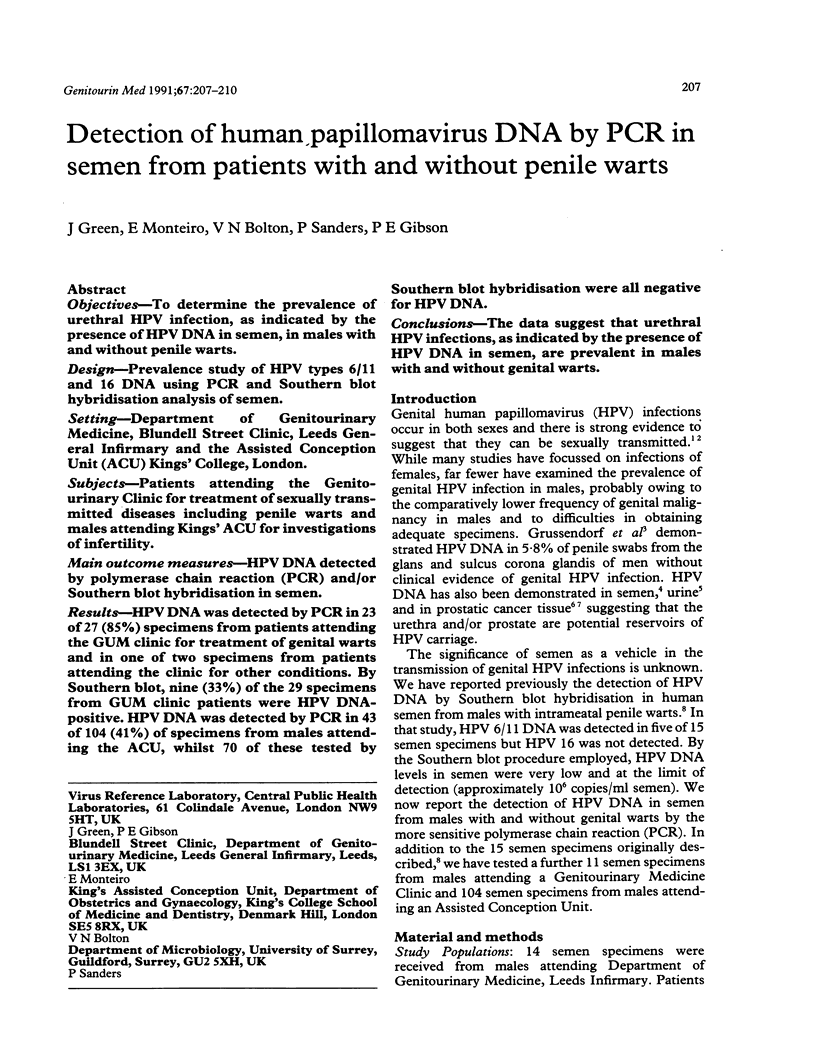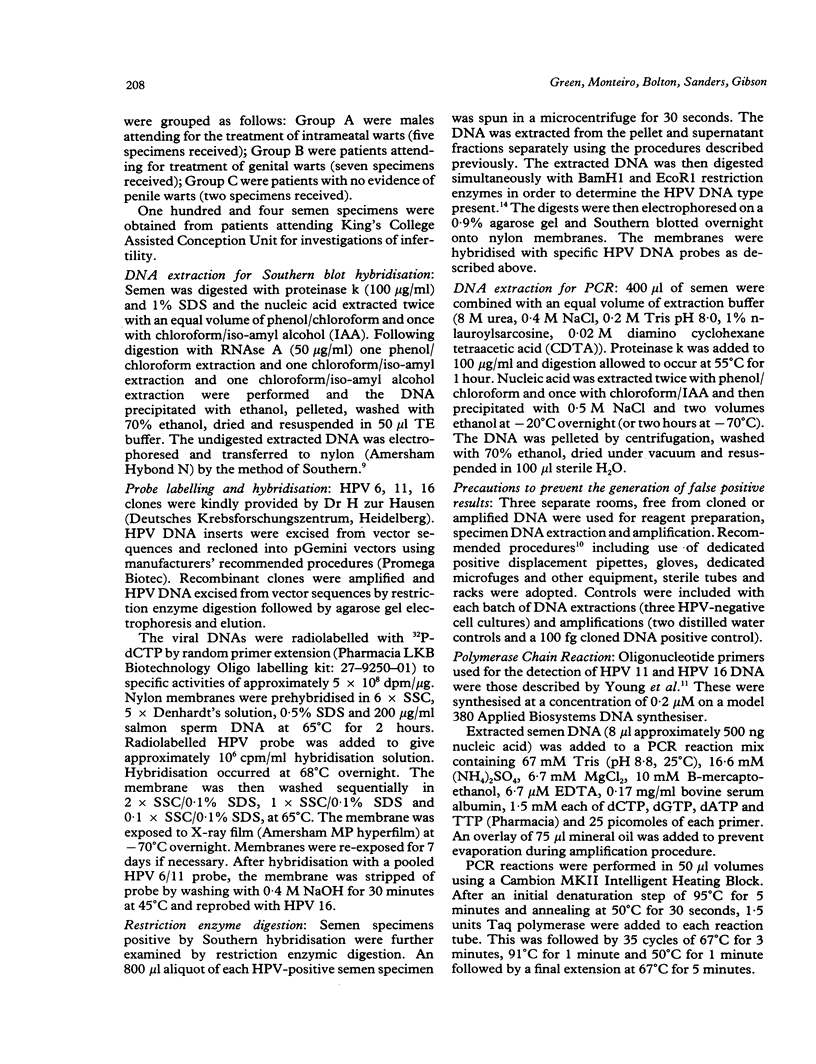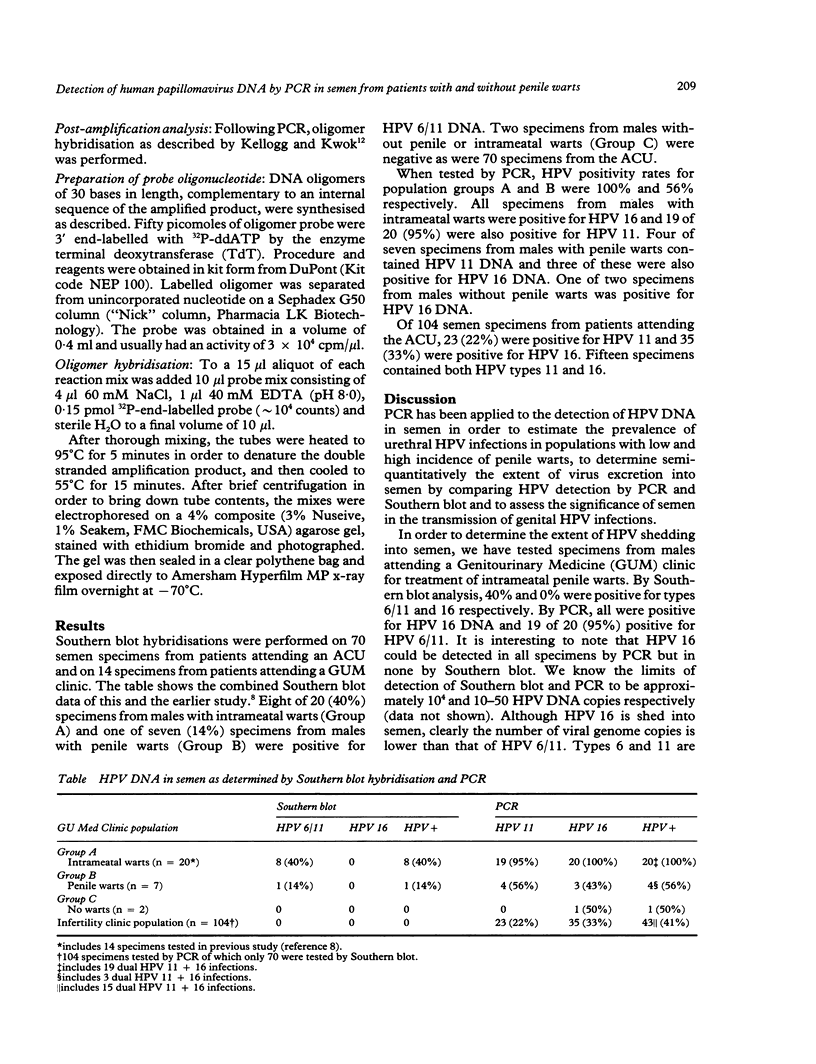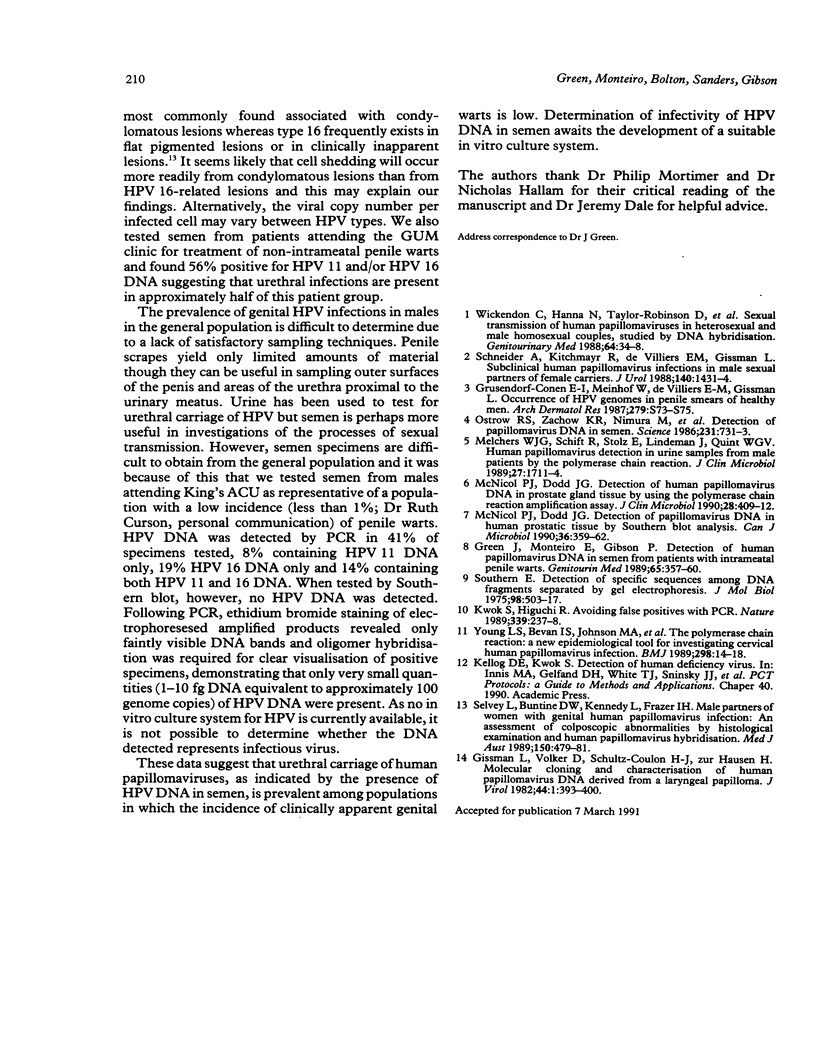Abstract
OBJECTIVES--To determine the prevalence of urethral HPV infection, as indicated by the presence of HPV DNA in semen, in males with and without penile warts. DESIGN--Prevalence study of HPV types 6/11 and 16 DNA using PCR and Southern blot hybridisation analysis of semen. SETTING--Department of Genitourinary Medicine, Blundell Street Clinic, Leeds General Infirmary and the Assisted Conception Unit (ACU) Kings' College, London. SUBJECTS--Patients attending the Genitourinary Clinic for treatment of sexually transmitted diseases including penile warts and males attending Kings' ACU for investigations of infertility. MAIN OUTCOME MEASURES--HPV DNA detected by polymerase chain reaction (PCR) and/or Southern blot hybridisation in semen. RESULTS--HPV DNA was detected by PCR in 23 of 27 (85%) specimens from patients attending the GUM clinic for treatment of genital warts and in one of two specimens from patients attending the clinic for other conditions. By Southern blot, nine (33%) of the 29 specimens from GUM clinic patients were HPV DNA-positive. HPV DNA was detected by PCR in 43 of 104 (41%) of specimens from males attending the ACU, whilst 70 of these tested by Southern blot hybridisation were all negative for HPV DNA. CONCLUSIONS--The data suggest that urethral HPV infections, as indicated by the presence of HPV DNA in semen, are prevalent in males with and without genital warts.
Full text
PDF



Selected References
These references are in PubMed. This may not be the complete list of references from this article.
- Green J., Monteiro E., Gibson P. Detection of human papillomavirus DNA in semen from patients with intrameatal penile warts. Genitourin Med. 1989 Dec;65(6):357–360. doi: 10.1136/sti.65.6.357. [DOI] [PMC free article] [PubMed] [Google Scholar]
- Grussendorf-Conen E. I., Meinhof W., de Villiers E. M., Gissmann L. Occurrence of HPV genomes in penile smears of healthy men. Arch Dermatol Res. 1987;279 (Suppl):S73–S75. doi: 10.1007/BF00585925. [DOI] [PubMed] [Google Scholar]
- Kwok S., Higuchi R. Avoiding false positives with PCR. Nature. 1989 May 18;339(6221):237–238. doi: 10.1038/339237a0. [DOI] [PubMed] [Google Scholar]
- McNicol P. J., Dodd J. G. Detection of human papillomavirus DNA in prostate gland tissue by using the polymerase chain reaction amplification assay. J Clin Microbiol. 1990 Mar;28(3):409–412. doi: 10.1128/jcm.28.3.409-412.1990. [DOI] [PMC free article] [PubMed] [Google Scholar]
- McNicol P. J., Dodd J. G. Detection of papillomavirus DNA in human prostatic tissue by Southern blot analysis. Can J Microbiol. 1990 May;36(5):359–362. doi: 10.1139/m90-062. [DOI] [PubMed] [Google Scholar]
- Melchers W. J., Schift R., Stolz E., Lindeman J., Quint W. G. Human papillomavirus detection in urine samples from male patients by the polymerase chain reaction. J Clin Microbiol. 1989 Aug;27(8):1711–1714. doi: 10.1128/jcm.27.8.1711-1714.1989. [DOI] [PMC free article] [PubMed] [Google Scholar]
- Ostrow R. S., Zachow K. R., Niimura M., Okagaki T., Muller S., Bender M., Faras A. J. Detection of papillomavirus DNA in human semen. Science. 1986 Feb 14;231(4739):731–733. doi: 10.1126/science.3003908. [DOI] [PubMed] [Google Scholar]
- Schneider A., Kirchmayr R., De Villiers E. M., Gissmann L. Subclinical human papillomavirus infections in male sexual partners of female carriers. J Urol. 1988 Dec;140(6):1431–1434. doi: 10.1016/s0022-5347(17)42065-9. [DOI] [PubMed] [Google Scholar]
- Selvey L., Buntine D. W., Kennedy L., Frazer I. H. Male partners of women with genital human papillomavirus infection. An assessment of colposcopic abnormalities by histological examination and human papillomavirus hybridization. Med J Aust. 1989 May 1;150(9):479-80, 482. doi: 10.5694/j.1326-5377.1989.tb136590.x. [DOI] [PubMed] [Google Scholar]
- Southern E. M. Detection of specific sequences among DNA fragments separated by gel electrophoresis. J Mol Biol. 1975 Nov 5;98(3):503–517. doi: 10.1016/s0022-2836(75)80083-0. [DOI] [PubMed] [Google Scholar]
- Takeya T., Feldman R. A., Hanafusa H. DNA sequence of the viral and cellular src gene of chickens. 1. Complete nucleotide sequence of an EcoRI fragment of recovered avian sarcoma virus which codes for gp37 and pp60src. J Virol. 1982 Oct;44(1):1–11. doi: 10.1128/jvi.44.1.1-11.1982. [DOI] [PMC free article] [PubMed] [Google Scholar]
- Wickenden C., Hanna N., Taylor-Robinson D., Harris J. R., Bellamy C., Carroll P., Malcolm A. D., Coleman D. V. Sexual transmission of human papillomaviruses in heterosexual and male homosexual couples, studied by DNA hybridisation. Genitourin Med. 1988 Feb;64(1):34–38. doi: 10.1136/sti.64.1.34. [DOI] [PMC free article] [PubMed] [Google Scholar]
- Young L. S., Bevan I. S., Johnson M. A., Blomfield P. I., Bromidge T., Maitland N. J., Woodman C. B. The polymerase chain reaction: a new epidemiological tool for investigating cervical human papillomavirus infection. BMJ. 1989 Jan 7;298(6665):14–18. doi: 10.1136/bmj.298.6665.14. [DOI] [PMC free article] [PubMed] [Google Scholar]


